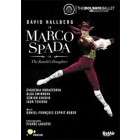|
Back
12/25/2014
Daniel-François-Esprit Auber: Marco Spada or The Bandit’s Daughter
David Hallberg (Marco Spada), Evguenia Obraztsova (Angela), Olga Smirnova (Marchesa Sampietri), Semyon Chudin (Prince Federici), Igor Tsvirko (Count Pepinelli), Alexei Loparevich (Brother Borromeo), Andrei Sitnikov (Prince Osario), Anastasia Stashkevich (Bride), Vyacheslav Lopatin (Groom)
The Bolshoi Ballet, Bolshoi Theatre Orchestra, Alexey Bogorad (Conductor), François Duplat (Video Director), Pierre Lacotte (Set, Scenography and Costume Designer), Damir Ismagilov (Lighting Designer), Pierre Lacotte (Choreographer)
Recording: The Bolshoi Theatre, Moscow, Russia (March 2014) – 126’ (& Bonus supplement 23’)
BelAir Classiques #BAC113 (or Blu-ray #BAC413) (Distributed by Naxos of America) – Subtitles in French and English – Booklet in English, French and German
   

Although officially (or unofficially) credited as founder of grand opéra (with the advent of La Muette de Portici in 1828), Daniel Auber went on to become one of France’s most prolific composers with comfortable grounding in opéra comique during the 19th century. Horace Vernet’s La Confession du bandit was the governing document from which Eugène Scribe and Germain Delavigne derived their libretto for Auber’s 1852 opéra comique. Auber and Scribe subsequently concocted a plan to resurrect Marco Spada into a ballet containing a wealth of new music that wound its way onto the stage in 1857 with a heavy dose of mime. How fickle the arts can be for this ballet never had a following, and it soon fell out of repertoire.
Choreographer Pierre Lacotte picks up where Joseph Mazillier left off (original choreographer) by reducing the latter’s salient pantomime and broadening the scope of fanciful jeu de jambes and geometrical lines. A continuity factor is gratifying for Mr. Lacotte returns to a freshly renovated Bolshoi theatre where he’s done a bit of tweaking, refining and re digesting of his original 1981 production that featured Rudolf Nureyev in the title role.
Even though Marco Spada (the ballet) is billed as a comedy, it, ironically, involves the death of the pickpocketing bandit in the closing minutes of the ballet. While the preposterous plot reigns supreme, Marco Spada is supported with Auber’s piquant melodies which frame the nimbleness of five principal dancers. Alexey Bogorad gives electrification to Auber’s opening bars with a proverbial snare drum, leading into the thematic polonaise militaire (returning again in Act III) that carries the movement forward (this greatly contrasts to Auber’s menacing opening notes composed for his opéra comique.)
Mr. Lacotte is everywhere in this production: sets, costuming and choreography. The reason is simple: he is marvelous in his interpretative aesthetics and balletic skills. Each act has a completely different setting, undoubtedly, adding to the complexities and lavishness of this production: the opening curtain finds a prominent Romanesque church set against a vibrantly azure blue sky while Act II is housed inside Prince Osario’s elaborate palace which contrasts to the cavernous hillsides in Act III. (Note: Act I is uncannily reminiscent of Bournonville's Napoli, but, undoubtedly, Marco Spada is the epitome of French ballet.) Pierre Lacotte uses the corps de ballet to magically melt into tight diagonal lines and uses a wonderful “layering” effect with alternating movement ribbons that provide an active yet subtle backdrop to the endless list of solos, variations, and pas-de-deux.
A historical moment occurred in 2011 when American danseur noble David Hallberg was approached and invited by Sergei Filin, The Bolshoi’s Artistic Director, to become the first American principal dancer to join the company. Juggling between commitments in Moscow and continuing engagements with American Ballet Theater (ABT), Mr. Hallberg is nothing short of amazing in Marco Spada. His long, slender legs lend itself to highly majestic prominence no matter what sort of mind boggling combination he’s endeavoring to execute...and execute he does with unblemished accord, marked by an impish smirk after each successful passage.
Evguenia Obraztsova’s onstage presence is sheer delight. She’s happy and very much “at home” in the role of Angela, and her maturity as a dancer continues to develop. The precision and nuances are accentuated but never affected; there’s confidence in her movements, but never braggart. Note the intricate steps and pauses she makes in “Variation of Angela” in Act III. Obraztsova also loves to “tease” the final notes of a variation.
Dancing the part of Marchesa Sampietri, Olga Smirnova has elegant beauty, and her technical detail is dexterous, but she leaves a cold impression; her diminutive “Dance with veil” (Act III, Scene I) is charming. Count Pepinelli, Captain of the dragoons, is danced by Igor Tsvirko whose sharp detailing is eye catching and endearing. He has genuine warmth; therefore, greater amount of pathos is placed on his character. Semyon Chudin’s Prince Federici takes off with great aplomb; the grandes jetés are lithe and pronounced although he comes across as being a bit too aloof.
Auber’s music pops along with subtle snippets and contrastingly overt measures of notes which were licensed from his other operas: Act II’s “Ballroom Dance” ushers in a reworking of La Neige (1823); Jenny Bell (1855) provides the musical backdrop to Act II’s “Dance with candlelights” and “Conclusion”; compliments of tendre French horns herald Obraztsova’s “Arrival of Angela” (97‘ 28) taken from Fra Diavolo (1830); a purloined variation buried inside Act II (82’) can traced to Le Premier jour de Bonheur (1868.) It is not until the death of Marco Spada where the musical transcription from Auber’s opéra comique “Ouverture” prevails.
This is a superb production for any ballet enthusiast. Once again, an obscure work is brought to the stage in a culmination of the arts with pleasing and sophisticated balance.
Christie Grimstad
|